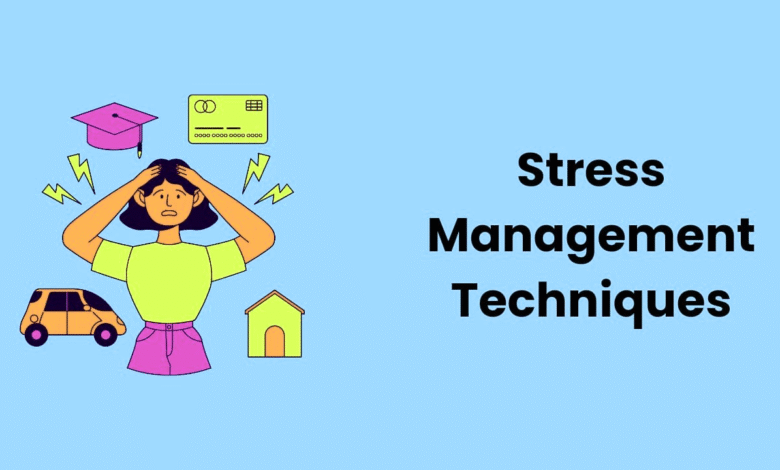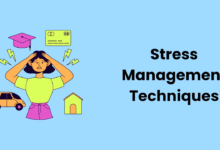Stress Management Techniques: Proven Methods for Modern Life
Discover proven stress management techniques for modern life. Learn breathing exercises, mindfulness, and effective coping strategies to reduce stress.

Modern life presents unprecedented challenges that can overwhelm even the most resilient individuals. From demanding work schedules to financial pressures, relationship struggles, and constant digital connectivity, stress has become an inevitable part of our daily existence. Understanding and implementing effective stress management techniques is no longer optional—it’s essential for maintaining both physical and mental well-being in today’s fast-paced world.
Chronic stress affects millions of people globally, contributing to serious health conditions including cardiovascular disease, depression, anxiety disorders, and compromised immune function. The good news is that numerous evidence-based strategies can help you regain control over your stress levels and improve your overall quality of life.
EXPLORE THE CONTENTS
Understanding Stress and Its Impact on Health
Stress represents your body’s natural response to perceived threats or challenges, triggering the release of hormones like cortisol and adrenaline. While short-term stress can be beneficial, providing motivation and focus during critical situations, prolonged exposure to stressors creates significant health risks.
The physiological effects of chronic stress include elevated blood pressure, disrupted sleep patterns, digestive issues, and weakened immunity. Psychologically, ongoing stress contributes to anxiety, depression, irritability, and cognitive impairment. Recognizing these warning signs enables you to take proactive steps toward better stress management.
Research indicates that individuals who actively practice stress reduction techniques experience improved cardiovascular health, enhanced immune function, better sleep quality, and increased life satisfaction. The key lies in finding the right combination of strategies that work for your unique lifestyle and preferences.
Breathing Techniques for Immediate Stress Relief
Deep breathing exercises serve as one of the most accessible and effective stress management techniques available. These methods work by activating your parasympathetic nervous system, which promotes relaxation and counters the stress response.
Diaphragmatic Breathing
Also known as belly breathing, this technique involves breathing deeply into your diaphragm rather than shallow chest breathing. To practice diaphragmatic breathing, place one hand on your chest and another on your stomach. Breathe in slowly through your nose, ensuring that your stomach rises more than your chest. Exhale gradually through pursed lips, feeling your stomach fall.
Practice this technique for five to ten minutes daily, gradually increasing the duration as you become more comfortable. Many people find that incorporating diaphragmatic breathing into their morning routine helps set a calm tone for the entire day.
Box Breathing Method
Box breathing, utilized by Navy SEALs and other high-stress professionals, involves breathing in equal counts of four. Inhale for four counts, hold for four counts, exhale for four counts, and hold empty for four counts. This structured approach helps regulate your nervous system and provides immediate stress relief during challenging situations.
4-7-8 Breathing Technique
Developed by Dr. Andrew Weil, the 4-7-8 technique involves inhaling for four counts, holding for seven counts, and exhaling for eight counts. This method is particularly effective for reducing anxiety and promoting better sleep quality. Practice this technique up to four cycles at a time, especially before bedtime or during stressful moments.
Mindfulness and Meditation Practices
Mindfulness meditation has gained significant recognition as one of the most powerful stress management techniques supported by extensive scientific research. Regular meditation practice literally changes your brain structure, increasing gray matter in areas associated with emotional regulation and decreasing activity in regions linked to stress and anxiety.
Basic Mindfulness Meditation
Begin with just five minutes of daily practice, gradually extending the duration as your concentration improves. Find a quiet space, sit comfortably with your spine straight, and focus on your breath. When thoughts arise, acknowledge them without judgment and gently redirect your attention to breathing.
Consistency matters more than duration when establishing a meditation practice. Many successful practitioners recommend meditating at the same time each day, creating a sustainable routine that becomes second nature.
Body Scan Meditation
This technique involves systematically focusing attention on different parts of your body, promoting awareness of physical tension and encouraging relaxation. Start at the top of your head and slowly move your attention downward, noticing any sensations without trying to change them.
Body scan meditation is particularly effective for individuals who carry stress physically, helping them identify and release tension they may not have consciously noticed.
Loving-Kindness Meditation
This practice involves directing compassionate thoughts toward yourself and others, which can significantly reduce stress related to interpersonal conflicts and self-criticism. Begin by sending loving thoughts to yourself, then gradually extend these wishes to loved ones, acquaintances, and even difficult people in your life.
Research shows that loving-kindness meditation increases positive emotions, reduces implicit bias, and strengthens social connections—all factors that contribute to lower stress levels.
Physical Exercise and Movement for Stress Reduction
Regular physical activity stands among the most effective stress relief methods available, offering both immediate and long-term benefits for stress management. Exercise reduces stress hormones like cortisol while stimulating the production of endorphins, your body’s natural mood elevators.
Cardiovascular Exercise
Activities like running, cycling, swimming, or brisk walking provide excellent stress relief while improving overall cardiovascular health. Aim for at least 150 minutes of moderate-intensity exercise weekly, as recommended by health authorities.
The rhythmic nature of cardiovascular exercise can be particularly meditative, providing mental clarity and emotional release. Many people find that their best problem-solving occurs during or after aerobic exercise sessions.
Strength Training
Resistance training offers unique stress management benefits by building physical confidence and providing a constructive outlet for frustration and tension. The focused attention required during strength training also serves as a form of moving meditation.
Yoga and Tai Chi
These mind-body practices combine physical movement with breath awareness and mindfulness, making them exceptionally effective for stress reduction. Yoga has been shown to reduce cortisol levels, improve mood, and enhance overall well-being.
Tai Chi, often called “meditation in motion,” involves slow, flowing movements that promote balance, flexibility, and mental calm. Both practices are suitable for people of all fitness levels and can be adapted to individual needs and limitations.
Cognitive Behavioral Strategies
Cognitive behavioral techniques address stress by changing thought patterns and behavioral responses that contribute to stress and anxiety. These evidence-based approaches help you develop more adaptive ways of thinking about and responding to stressful situations.
Identifying Negative Thought Patterns
Common stress-inducing thought patterns include catastrophizing (imagining the worst possible outcomes), all-or-nothing thinking, and personalization (taking responsibility for things beyond your control). Learning to recognize these patterns is the first step toward changing them.
Keep a thought journal for one week, recording stressful situations and your immediate thoughts. Look for recurring themes and patterns that may be contributing unnecessarily to your stress levels.
Cognitive Restructuring
This technique involves challenging negative thoughts and replacing them with more balanced, realistic alternatives. When you notice a stress-inducing thought, ask yourself: “Is this thought helpful? What evidence supports or contradicts it? What would I tell a friend in this situation?”
Problem-Solving Skills
Effective problem-solving reduces stress by helping you take constructive action rather than ruminating on difficulties. Break large problems into smaller, manageable steps, brainstorm multiple solutions, and focus on aspects you can control rather than those you cannot.
Time Management and Organization
Poor time management significantly contributes to stress levels, creating feelings of overwhelm and loss of control. Implementing effective time management strategies can dramatically reduce daily stress while improving productivity and life satisfaction.
Priority Setting
Use methods like the Eisenhower Matrix to categorize tasks based on urgency and importance. Focus your energy on important activities while minimizing time spent on urgent but unimportant tasks that create stress without adding value.
Task Batching
Group similar activities together to improve efficiency and reduce the mental energy required for task-switching. For example, designate specific times for checking and responding to emails rather than constantly monitoring your inbox throughout the day.
Digital Boundaries
Constant connectivity contributes significantly to modern stress levels. Establish clear boundaries around technology use, including designated phone-free times, email checking schedules, and social media limits.
Consider implementing a digital sunset routine, avoiding screens for at least one hour before bedtime to improve sleep quality and reduce stress-related insomnia.
Social Support and Connection
Strong social connections serve as a powerful buffer against stress, providing emotional support, practical assistance, and perspective during difficult times. Social support has been consistently linked to better mental health outcomes and increased resilience.
Building Meaningful Relationships
Invest time in nurturing relationships with family members, friends, and colleagues who provide positive support. Quality matters more than quantity when it comes to social connections—a few deep, meaningful relationships provide more stress protection than numerous superficial ones.
Communication Skills
Effective communication reduces interpersonal stress by preventing misunderstandings and resolving conflicts constructively. Practice active listening, express your needs clearly and respectfully, and learn to set healthy boundaries in relationships.
Community Involvement
Participating in community activities, volunteer work, or support groups provides social connection while contributing to something larger than yourself. This sense of purpose and connection significantly reduces stress and improves overall well-being.
Also Read: The 9 Best Parenting Tips for New Parents
Lifestyle Modifications for Long-term Stress Management
Sustainable stress management requires attention to fundamental lifestyle factors that either support or undermine your ability to cope with daily pressures.
Sleep Hygiene
Quality sleep is essential for stress management, as sleep deprivation significantly impairs your ability to cope with challenges. Establish a consistent sleep schedule, create a relaxing bedtime routine, and optimize your sleep environment for temperature, darkness, and quiet.
Avoid caffeine late in the day, limit screen time before bed, and consider relaxation techniques like progressive muscle relaxation or gentle stretching to prepare your body for sleep.
Nutrition and Stress
What you eat directly impacts your stress levels and ability to manage challenges. Focus on whole foods, including plenty of fruits, vegetables, lean proteins, and complex carbohydrates. Limit caffeine, alcohol, and processed foods that can exacerbate stress and anxiety.
Consider incorporating stress-fighting nutrients like omega-3 fatty acids, magnesium, and B vitamins through food sources or supplements after consulting with a healthcare provider.
Hydration
Dehydration increases cortisol levels and can worsen stress symptoms. Aim for adequate water intake throughout the day, adjusting for activity level, climate, and individual needs.
Professional Help and When to Seek It
While self-help stress management techniques are often effective, some situations require professional support. Consider seeking help from a mental health professional if stress is significantly impacting your daily functioning, relationships, or physical health.
Stress counseling and therapy provide personalized strategies for managing stress while addressing underlying factors that may contribute to chronic stress. Cognitive-behavioral therapy, in particular, has strong research support for stress and anxiety management.
Don’t hesitate to consult with healthcare providers about stress-related physical symptoms or if you’re considering medication options for anxiety or depression related to chronic stress.
Creating Your Personal Stress Management Plan
Effective stress management requires a personalized approach that considers your unique circumstances, preferences, and lifestyle. Start by identifying your primary stress triggers and current coping mechanisms, then gradually incorporate new techniques.
Begin with one or two strategies that appeal to you most, practicing them consistently for several weeks before adding additional techniques. This gradual approach increases the likelihood of long-term success and prevents the overwhelm that can come from trying to change too much at once.
Track your progress using a stress journal or smartphone app, noting which techniques are most effective for different types of stressful situations. Adjust your approach as needed, remembering that stress management is an ongoing process rather than a destination.
Conclusion
Managing stress in modern life requires a multifaceted approach that addresses both immediate stress relief and long-term resilience building. The stress management techniques outlined in this article provide a comprehensive toolkit for reducing stress and improving overall well-being.
Remember that developing effective stress management skills takes time and practice. Be patient with yourself as you experiment with different approaches and find what works best for your unique situation. The investment you make in learning and practicing these techniques will pay dividends in improved health, better relationships, and increased life satisfaction.
Start today with one simple technique—perhaps a few minutes of deep breathing or a brief walk outdoors. Small, consistent actions compound over time to create significant positive changes in your stress levels and overall quality of life. Your future self will thank you for taking this important step toward better stress management and well-being.




